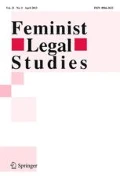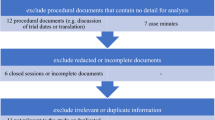Abstract
Recent scholarship has given increasing attention to studying women’s involvement in conflict and mass violence. However, there is comparatively less discussion of the experiences of women as actors and perpetrators in conflict, and limited discussion of women as defendants in international criminal tribunals. This article explores this under-researched area. By analysing legal materials from the cases of six female defendants, this article investigates the extent to which legal discourses are shaped by stereotypes regarding femininity, conflict and peace. It identifies three gender narratives—mothers, monsters and wives—used in relation to female defendants, which highlight the incompatibility of femininity with violence, and deny women’s agency in political and military contexts. Thus, this article concludes that female defendants in international criminal tribunals are viewed through gendered lenses, and discussed in accordance with gendered themes. This gendered justice is problematic, as it reinforces patriarchal gender stereotypes, and may hinder attempts to facilitate gender justice.
Similar content being viewed by others
Notes
That is, excluding administration of justice offences.
Calculated with reference to the number of people subject to an arrest warrant, summons or indictment for an international criminal law offence in the Extraordinary African Chambers, the Extraordinary Chambers in the Courts of Cambodia, the ICC, ICTR, ICTY, the International Military Tribunal for the Far East, the Nuremberg International Military Tribunal, the Special Court of Sierra Leone, the Special Tribunal for Lebanon, the War Crimes Chamber of the Court of Bosnia and Herzegovina, and prosecutions arising out of the United Nations Mission in Kosovo. The total number of people subject to an arrest warrant, summons or indictment in these courts was 566 as of October 2017.
Prosecutor v Nyiramasuhuko, Ntahobali, Nsabimana, Nteziryayo, Kanyabashi and Ndayambaje (Nyiramasuhuko et al.), Transcript, 6 September 2005, 22.
Prosecutor v Nyiramasuhuko, Ntahobali, Nsabimana, Nteziryayo, Kanyabashi and Ndayambaje, Transcript, 20 April 2009, 25.
Prosecutor v Nyiramasuhuko, Ntahobali, Nsabimana, Nteziryayo, Kanyabashi and Ndayambaje, Transcript, 6 October 2005, 7.
Co-Prosecutors v Chea, Sary, Thirith and Samphan (Chea et al), Closing Order, 002/19-09-2007-ECCC/OCIJ D427, para. 1608.
Prosecutor v Gbagbo, Response on behalf of Simone Gbagbo to the “requête de la République de Côte d’Ivoire sur la recevabilité de l’affaire, le procureur c. Simone Gbagbo et demande de sursis à exécution en vertu des Articles 17, 19 et 95 du Statut de Rome”, ICC-02/11-01/12-39, paras. 39–40.
Prosecutor v Plavšić, Statement by Biljana Plavšić in support of her motion for a change of plea pursuant to Rule 62 bis, IT-00-39&40-PT D6523-D6517, 1.
Prosecutor v Plavšić, Sentencing Hearing, Transcript, 17 December 2002, 610.
Prosecutor v Plavšić, Sentencing Judgment, IT-00-39&40/I-S, para. 93. See also Prosecutor v Plavšić, Sentencing Hearing, Transcript, 16 December 2002.
Co-Prosecutors v Chaem, Closing Order, 004/1/07-09-2009-ECCC-OCIJ, para. 176.
Prosecutor v Nyiramasuhuko, Ntahobali, Nsabimana, Nteziryayo, Kanyabashi and Ndayambaje, Transcript, 31 January 2005, 16.
Prosecutor v Nyiramasuhuko, Ntahobali, Nsabimana, Nteziryayo, Kanyabashi and Ndayambaje, supra n 4, 31.
Ibid 30.
Prosecutor v Plavšić, Transcript, supra n 10, 459.
Prosecutor v Gbgabo, Decision on the Prosecutor’s application pursuant to Article 58 for a warrant of arrest against Simone Gbagbo, ICC-02/11-01/12-2-Red, para. 30.
Ibid.
Ibid para. 5.
Ibid para. 15.
Co-Prosecutors v Chea, Sary, Thirith and Samphan, supra n 7, paras. 994–1017, 1201–1226.
Ibid para. 1202.
Ibid para. 994.
Ibid para. 999.
Ibid para. 1206.
Ibid para. 1224.
Ibid para. 1017.
Ibid para. 1222.
Ibid para. 1587.
Ibid paras. 1605–1606.
Prosecutor v Handanović, First Instance Verdict, S 1 1 K 009162 12 Kro, para 15.
Ibid para. 76.
Prosecutor v Nyiramasuhuko, Ntahobali, Nsabimana, Nteziryayo, Kanyabashi and Ndayambaje, Transcript, 31 August 2005, 48.
Co-Prosecutors v Chaem, supra n 12, para. 165.
Ibid.
References
African Rights. 1995. Rwanda, Not So Innocent: When Women Become Killers. London: African Rights.
Åhäll, Linda. 2015. Sexing War/Policing Gender: Motherhood, Myth and Women’s Political Violence. Abingdon: Routledge.
Alison, Miranda. 2009. Women and Political Violence: Female Combatants in Ethno-National Conflict. Abingdon: Routledge.
Berrington, Eileen, and Päivi Honkatukia. 2002. An Evil Monster and a Poor Thing: Female Violence in the Media. Journal of Scandinavian Studies in Criminology and Crime Prevention 3 (1): 50–72.
Brown, Sara E. 2014. Female Perpetrators of the Rwandan Genocide. International Feminist Journal of Politics 16 (3): 448–469.
Chappell, Louise A. 2016. The Politics of Gender Justice at the International Criminal Court: Legacies and Legitimacy. Oxford: Oxford University Press.
Chappell, Louise A., and Andrea Durbach. 2014. The International Criminal Court: A Site of Gender Justice? International Feminist Journal of Politics 16 (4): 533–537.
Chinkin, Christine, and Mary Kaldor. 2013. Gender and New Wars. Journal of International Affairs. 67 (1): 167–187.
Commerson, Scott. 2003. Villain or Victim? Myths, Gender, and the Insanity Defense. Developments in Mental Health Law 22 (1): 1–17.
Côté, Luc. 2005. Reflections on the Exercise of Prosecutorial Discretion in International Criminal Law. Journal of International Criminal Justice 3 (1): 162–186.
Dembour, Marie-Bénédicte, and Emily Haslam. 2004. Silencing Hearings? Victim–Witnesses at War Crimes Trials. European Journal of International Law 15 (1): 151–177.
Drumbl, Mark A. 2012. She Makes Me Ashamed to Be a Woman: The Genocide Conviction of Pauline Nyiramasuhuko, 2011. Michigan Journal of International Law 34 (3): 559–603.
Eaton, Mary. 1986. Justice for Women? Family, Court and Social Control. Philadelphia: Open University Press.
Elshtain, Jean Bethke. 1987. Women and War. Chicago: University of Chicago Press.
Franklin, Daniel. 2008. Failed Rape Prosecutions at the International Criminal Tribunal for Rwanda. Georgetown Journal of Gender and the Law 9 (1): 181–214.
Fraser, Nancy. 1997. Justice Interruptus: Critical Reflections on the “Postsocialist” Condition. Abingdon: Routledge.
Fraser, Nancy. 2009. Scales of Justice: Reimagining Political Space in a Globalizing World. New York: Columbia University Press.
Gardam, Judith. 1997. An Alien’s Encounter with the Law of Armed Conflict. In Sexing the Subject of Law, ed. Ngaire Naffine, and Rosemary Owens, 233–250. Wellington: LBC Information Services.
Gardam, Judith. 2010. War, Law, Terror, Nothing New for Women. Australian Feminist Law Journal 32 (1): 61–75.
Gardam, Judith, and Hilary Charlesworth. 2000. Protection of Women in Armed Conflict. Human Rights Quarterly 22 (1): 148–166.
Geneva Convention Relative to the Protection of Civilian Persons in Time of War (Geneva Convention IV). 1949. 75 UNTS 287. Opened for signature 12 August 1949, entered into force 21 October 1950.
Goetz, Anne Marie. 2007. Gender Justice, Citizenship and Entitlements: Core Concepts, Central Debates and New Directions for Research. In Gender Justice, Citizenship and Development, ed. Maitrayee Mukhopadhyay, and Navsharan Singh, 15–57. Ottawa: Zubaan.
Grewal, Kiran K. 2015. International Criminal Law as a Site for Enhancing Women’s Rights? Challenges, Possibilities, Strategies. Feminist Legal Studies 23 (2): 149–165.
Henshaw, Alexis L. 2016. Where Women Rebel: Patterns of Women’s Participation in Armed Rebel Groups 1990–2008. International Feminist Journal of Politics 18 (1): 1–22.
Hogg, Nicole. 2010. Women’s Participation in the Rwandan Genocide: Mothers or Monsters? International Review of the Red Cross 92 (877): 69–102.
International Criminal Court Office of the Prosecutor (ICC OTP). 2008. ICC Prosecutor Appoint Prof. Catharine A. MacKinnon as Special Adviser on Gender Crimes. https://www.icc-cpi.int/Pages/item.aspx?name=icc%20prosecutor%20appoints%20prof_%20catharine%20a.%20mackinnon%20as%20special%20adviser%20on%20gender%20crimes. Accessed October 8, 2016.
International Criminal Court Office of the Prosecutor (ICC OTP). 2014. Policy Paper on Sexual and Gender-Based Crimes. https://www.icc-cpi.int/iccdocs/otp/OTP-Policy-Paper-on-Sexual-and-Gender-Based-Crimes–June-2014.pdf. Accessed October 8, 2016.
Kaldor, Mary. 2012. New and Old Wars: Organised Violence in a Global Era. Cambridge: Polity Press.
Lazar, Michelle M. 2005. Politicising Gender in Discourse: Feminist Critical Discourse Analyis as Political Perspective and Praxis. In Feminist Critical Discourse Analysis: Gender, Power and Ideology in Discourse, ed. Michelle M. Lazar, 1–28. Basingstoke: Palgrave Macmillan.
Lazar, Michelle M. 2007. Feminist Critical Discourse Analysis: Articulating a Feminist Discourse Praxis. Critical Discourse Studies 4 (2): 141–164.
Linton, Susan. 2016. Women Accused of International Crimes: A Trans-Disciplinary Inquiry and Methodology. Criminal Law Forum 27 (2): 159–226.
Lloyd, Ann. 1995. Doubly Deviant, Doubly Damned: Society’s Treatment of Dangerous Women. Harmondsworth: Penguin.
Lower, Wendy. 2013. Hitler’s Furies: German Women in the Nazi Killing Fields. London: Random House Vintage.
Moser, Caroline, and Fiona Clark. 2001. Introduction. In Victims, Perpetrators or Actors? Gender, Armed Conflict and Political Violence, ed. Caroline Moser, and Fiona Clark, 3–12. New York: Palgrave Macmillan.
Neale, Joanne. 2016. Iterative Categorization (IC): A Systematic Technique for Analysing Qualitative Data. Addiction 111: 1096–1106.
Niarchos, Catherine N. 1995. Women, War, and Rape: Challenges Facing the International Tribunal for the Former Yugoslavia. Human Rights Quarterly 17 (4): 649–690.
Oberti, Charlotte. 2016. Ivory Coast Confronts Brutal Past with Trial of “Iron Lady” Simone Gbagbo. http://www.france24.com/en/20160531-ivory-coast-iron-lady-simone-gbagbo-confronts-controversial-past-again. Accessed June 28, 2016.
Otto, Dianne. 2013. International Human Rights Law: Towards Rethinking Sex/Gender Dualism and Asymmetry. In The Ashgate Research Companion to Feminist Legal Theory, ed. Margaret Davies, and Vanessa E. Munro, 197–215. Abingdon: Routledge.
Protocol Additional to the Geneva Conventions of 12 August 1949, and Relating to the Protection of Victims of International Armed Conflicts (Additional Protocol I). 1977. 1125 UNTS 3. Opened for signature 8 June 1977, entered into force 7 December 1978.
Rome Statute of the International Criminal Court (Rome Statute). 1998. 2187 UNTS 3. Opened for signature 17 July 1998, entered into force 1 July 2002.
Ruddick, Sara. 1989. Maternal Thinking: Towards a Politics of Peace. Boston: Beacon Press.
Shepherd, Laura J. 2008. Gender, Violence and Security: Discourse as Practice. London: Zed Books.
Shepherd, Laura J. 2011. Sex, Security and Superhero(in)es: From 1325 to 1820 and Beyond. International Feminist Journal of Politics 13 (4): 504–521.
Sjoberg, Laura, and Caron E. Gentry. 2007. Mothers, Monsters, Whores: Women’s Violence in Global Politics. London: Zed Books.
Smart, Carol. 1976. Women, Crime and Criminology: A Feminist Critique. London: Routledge.
Smeulers, Alette. 2015. Female Perpetrators: Ordinary or Extra-Ordinary Women? International Criminal Law Review 15 (2): 207–253.
Sperling, Carrie. 2006. Mother of Atrocities: Pauline Nyiramasuhuko’s Role in the Rwandan Genocide. Fordham Urban Law Journal 33 (2): 637–664.
Steward, Kate. 2006. Gender Considerations in Remand Decision-Making. In Gender and Justice: New Concepts and Approaches, ed. Frances M. Heidensohn, 125–146. Portland: Willan Publishing.
United Nations Security Council Resolution 1325. 2000. 4213th meeting. UN Doc S/RES/1325.
Worrall, Ann. 1981. Out of Place: Female Offenders in Court. Probation Journal 28 (3): 90–93.
Worrall, Ann. 1990. Offending Women: Female Lawbreakers and the Criminal Justice System. London: Routledge.
Yuval-Davis, Nira. 1997. Gender and Nation. London: Sage.
Acknowledgements
I would like to thank Professor Sarah Williams, Professor Louise Chappell, Dr Michael Grewcock and the two anonymous reviewers for their helpful feedback. I would also like to acknowledge the feedback received from participants at the fifth International Criminal Law Workshop held at Melbourne Law School on 4 September 2017. This research was funded partially by the Australian Government through the Australian Research Council (DP140102274).
Author information
Authors and Affiliations
Corresponding author
Rights and permissions
About this article
Cite this article
Hodgson, N. Gender Justice or Gendered Justice? Female Defendants in International Criminal Tribunals. Fem Leg Stud 25, 337–357 (2017). https://doi.org/10.1007/s10691-017-9359-7
Published:
Issue Date:
DOI: https://doi.org/10.1007/s10691-017-9359-7



